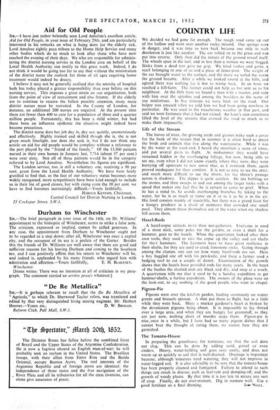Aid for Old People
Sta,—I have just rather belatedly seen Lord Amulree's excellent article, Aid for Old People, in your issue of February 29th, and am particularly interested in his remarks on what is being done for the elderly sick. Lord Amutree rightly pays tribute to the Home Help Service and many other bodies which do so much to look after those who have now reached the evening of their days. We who are responsible for adminis- tering the district nursing service in the London area on behalf of the Local Health Authority can testify to this great work. Indeed, I do not think it would be going too far to say that without the ministration of the district nurse the outlook for those of all ages requiring home treatment would indeed be dreary.
I believe it may not be generally realised that the scarcity of hospital beds has today placed a greater responsibility than ever before on this nursing service. This imposes a great strain on our organisation, both from the point of view of recruitment and also finance. If the elderly are to continue to receive the fullest possible attention, many more district nurses must be recruited. In the County of London, for instance, an additional 200 nurses are required. At the present time there are fewer than 400 to care for a population of three and a quarter million people. Fortunately, this has been a mild winter, but had there been an influenza epidemic the situation might indeed have become precarious.
The district nurse does her job day in, day out, quietly, unostentiously and effectively. Highly trained and skilled though she is, she is not given much limelight, nor does she seek it, but I do not think any article on aid for old people would be complete without a reference to the part played by the "friend of the family." Of the 13,500 patients nursed in their own homes in January last, 7,714 (about 57 per cent.) were over sixty. Not all of these patients would be in the category referred to by Lord Amutree. Nevertheless the figures 'are significant.
The London service, too, is still a voluntary one, receiving a 90 per cent. grant from the Local Health Authority. We have been lately gratified to find that, as the fact of our voluntary status becomes more widely recognised, more sympathisers have been kind enough to include us in their list of good causes, but with rising costs the 10 per cent. we have to find becomes increasingly difficult.—Yours faithfully,
HAROLD KENYON, Chairman, Central Council for District Nursing in London. 25 Cockspur Street, S.W.I.


































 Previous page
Previous page